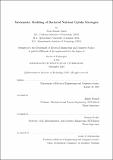Mechanistic modeling of bacterial nutrient uptake strategies
Author(s)
Norris, Noele Rosalie.
Download1142187796-MIT.pdf (7.356Mb)
Other Contributors
Massachusetts Institute of Technology. Department of Electrical Engineering and Computer Science.
Advisor
Emilio Frazzoli and Roman Stocker.
Terms of use
Metadata
Show full item recordAbstract
Bacteria have developed a variety of strategies to nd and consume the substrates necessary for both the cell's energy-consuming processes and for the additional biomass needed to replicate. A greater understanding of the diversity and regulation of these strategies can provide us with a number of insights relevant for a variety of applications, from predicting bacterial population dynamics and thus carbon-cycling rates in the ocean to bio-engineering bacteria into microscale robots. Here I use toy, mechanistic models of single-cell metabolism that allow me to quantify the costs and benefits of various nutrient uptake strategies. I find that: (i) a sensing-uptake trade-off governs E. coli's regulation of maltose uptake and chemotaxis to maltose; (ii) a rate-affinity trade-off in nutrient transport systems governs the speciation of marine oligotrophic and copiotrophic heterotrophs; and (iii) an exploration-conservation trade-off governs the prevalence of motility in the marine microbial world. This work thus provides new understanding of how both phenotypic diversity and cellular regulation are governed by trade-offs for maximizing growth rate in dierent environments.
Description
This electronic version was submitted by the student author. The certified thesis is available in the Institute Archives and Special Collections. Thesis: Ph. D., Massachusetts Institute of Technology, Department of Electrical Engineering and Computer Science, 2019 Cataloged from student-submitted PDF version of thesis. Includes bibliographical references (pages 155-172).
Date issued
2019Department
Massachusetts Institute of Technology. Department of Electrical Engineering and Computer SciencePublisher
Massachusetts Institute of Technology
Keywords
Electrical Engineering and Computer Science.